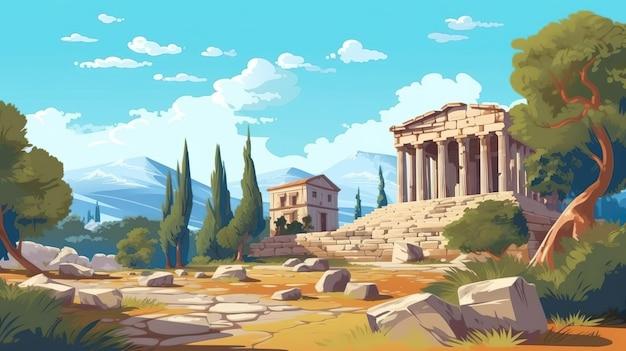It’s time to dive into the fascinating world of ancient Greece, where two powerful city-states, Athens and Sparta, reigned supreme. Today, we’ll focus on Athens and explore why many believe it was superior to its rival, Sparta. From their contrasting governmental systems to their cultural and intellectual achievements, Athens has captured the attention and admiration of historians and enthusiasts alike. Join us as we uncover the reasons why Athens stood out in this epic battle for dominance. So grab your virtual shield and let’s embark on this historical adventure!
Note: Please remember that the blog post will discuss the reasons why Athens was considered better than Sparta, taking into account historical context and perspectives.
Why Athens Outshines Sparta
The Land of Knowledge: Athens
When it comes to intellectual prowess, Athens takes the crown like a philosopher king. While Sparta may have been known for its military might, Athens boasted a thriving cultural and artistic scene that titillated the minds of its citizens. The Acropolis stood tall and proud, showcasing impressive architectural marvels that still leave us in awe today. The ancient Athenians didn’t just build structures; they built a foundation for knowledge and learning that would shape the Western world for centuries to come.
A Democracy That Actually Works
While Spartan society was more autocratic, with a few elite calling the shots, Athens embraced democracy like an enthusiastic politician running for office. Athenians had a say in their own governance, making decisions collectively in the agora. Every citizen—well, every male citizen, to be precise—had a voice, and they weren’t afraid to use it. Unlike in Sparta, where conformity and obedience were the order of the day, Athens flourished under the democratic principles that gave birth to a society that valued individual freedom and expression.
An Artistic Wonderland
If Sparta had an artistic side, it was probably hidden under a pile of discarded shields. Athens, on the other hand, was a hub of creativity and innovation. From theater to sculpture, literature to pottery, Athens overflowed with artistic brilliance. Playwrights like Aeschylus, Sophocles, and Euripides unleashed their dramatic genius on stages that still echo with their words today. Artists and architects, inspired by the ideals of beauty and symmetry, created masterpieces that continue to mesmerize art enthusiasts worldwide. It’s clear that Athens has the upper hand when it comes to infusing aesthetics into everyday life.
Celebrating the Mind, Not Just the Muscle
While Sparta was busy frolicking in physical combat, Athens was busy exercising its intellectual muscle. The Athenians revered thinkers such as Socrates, Plato, and Aristotle, who graced the world with their philosophical wisdom. In Athens, discussions on morality, ethics, and the nature of reality took center stage. While Sparta may have produced great warriors, Athens produced great minds that shaped the course of Western civilization. So, if you prefer stimulating conversations over a sweaty brawl, Athens is the place to be.
An Education Worth Writing Home About
In Athens, education was valued like the latest scroll by Plato. From a young age, Athenian children were taught a wide range of subjects, including reading, writing, music, and physical education. The city-state took education seriously, creating an environment that nurtured intellectual curiosity and fostered critical thinking skills. Wealthy families hired private tutors, and even poorer citizens had access to free education. The result? Athens became a hotbed of knowledge and innovation, where citizens were encouraged to question, explore, and expand their intellectual horizons.
With its commitment to education, democracy, culture, and intellectual pursuits, Athens simply outshines Sparta like a radiant sun outshines a flickering candle. While Sparta may have had its virtues, it’s clear that Athens was the true jewel of ancient Greece. So, next time you find yourself caught in a friendly debate about which city-state was better, simply let the wisdom of Athens shine through.
FAQ: Why Athens was Superior to Sparta
Why did Sparta Not Destroy Athens
Sparta did have the military might to destroy Athens, but they chose not to. In the past, Athens had proven to be a valuable ally against the Persians. Additionally, Sparta recognized that Athens was more focused on cultural and intellectual pursuits rather than military expansion. So, instead of risking an all-out war, Sparta decided to coexist with Athens.
Did Spartans have six-packs
Well, you can just imagine Spartans as the ancient Greek version of “Marvel superheroes” – strong and ripped. Their rigorous military training and physically demanding lifestyle certainly resulted in well-toned physiques. So, yes, it’s safe to say that Spartans had impressive six-packs.
Does it matter if you fight for Athens or Sparta
Absolutely! When it comes to choosing between Athens and Sparta, you’re not just picking a side, but also embracing an entire way of life. Athens, the city of arts and knowledge, offers a vibrant cultural scene and intellectual pursuits. On the other hand, Sparta, famed for its military prowess, values discipline and strength above all else. So, choosing between them means embracing their distinct philosophies and lifestyles.
Can Sparta take over Attika
Sorry to disappoint any potential aspiring Spartan conquerors, but in the year 2023, Sparta isn’t going to be taking over any regions. Those days are long gone. Historical rivalries aside, modern Attika, part of the modern country of Greece, is a peaceful and prosperous region that warmly welcomes visitors instead of facing conquerors.
Should I kill Hyrkanos
Ah, the infamous Hyrkanos! As tempting as it may be, siding with the mercenary Hyrkanos and taking him down isn’t necessary for the overall storyline. However, it wouldn’t hurt to bring a little justice to his misdeeds. So, the choice is yours, eagle-bearer.
How was Athens government different from Sparta
Athens and Sparta had vastly different forms of government. Athens embraced democracy, where all eligible citizens participated in decision-making. On the other hand, Sparta had a mixed government system, combining elements of monarchy, oligarchy, and democracy. Ultimately, Athens valued the power of the people, while Sparta focused on a balanced leadership structure.
Can you weaken Attika
Well, if you’re looking to create some chaos in the virtual world, weakening Attika might be a tempting endeavor. However, in reality, Attika is a thriving region that enjoys stability and development. So, for now, let’s leave Attika to its splendor and enjoy its historical wonders.
How big was a Spartan soldier
Let’s set the record straight – Spartans were not towering giants like characters from Greek mythology. On average, a Spartan soldier stood about 5 feet 7 inches tall (1.7 meters). However, what they lacked in height, they made up for in strength, skill, and unwavering determination.
Did Spartans use money
Contrary to the economic systems we’re familiar with today, Spartans didn’t rely on a traditional monetary system. Instead, they used iron bars as their currency, known as “spits” or “obols.” This unique approach served their focus on military prowess rather than commercial pursuits.
Do Conquest battles matter
Absolutely! Conquest battles offer exciting opportunities for players to showcase their combat skills and earn rewards. Engaging in these epic clashes allows you to influence the balance of power between factions and impact the overall political landscape of the game. So gear up, warrior, and embrace the thrill of conquest!
Where is Hyrkanos
Hyrkanos has his fingerprints all over the world of Assassin’s Creed Odyssey, but in the real world, he remains firmly within the realm of the game. You can find Hyrkanos as a character within the immersive virtual world, where his actions and fate unfold before your very eyes. Happy hunting!
Did Spartans throw babies off cliffs
Contrary to popular myth and the fictionalized movie portrayals, Spartans did not routinely throw babies off cliffs. This gruesome practice, known as “exposing,” was not a common part of their culture or military tradition. So rest assured, babies were safe from such extreme measures.
Did Sparta ever lose a war
As formidable as the Spartans were, they were not invincible. Throughout their history, they did suffer losses in various conflicts. Notably, they faced a significant defeat in the Battle of Leuctra in 371 BC against Thebes, which marked a turning point in Greek military history. So, even the mighty Spartans experienced the bitter taste of defeat.
How do you make conquest battles easier
Conquest battles can be quite challenging, but fear not, warrior! Here are a few tips to make your conquest journey easier:
- Level up and improve your gear to maximize your combat effectiveness.
- Recruit lieutenants with powerful abilities to aid you in battle.
- Analyze the battlefield and take advantage of strategic positions.
- Utilize adrenaline abilities and special attacks to devastate your foes.
- Engage in side quests and activities to gain experience and strengthen your character.
With these tactics in your arsenal, victory shall be within your reach!
What happens to a Spartan male at age 30
When a Spartan male reached the age of 30, known as the “Krypteia,” he went through a rite of passage called the “agoge.” This marked his transition from youth to adulthood and symbolized his full acceptance as a Spartan citizen. From there, he would take on various responsibilities, including military service and political participation, as a respected member of Spartan society.
Why was Athens better than Sparta
Well, the concept of “better” can be subjective, but many argue that Athens had a lot going for it. Athens was a hub of intellectual and cultural progress, fostering great thinkers like Socrates, Plato, and Aristotle. The city-state also valued democracy and individual freedom, allowing its citizens to actively participate in political decision-making. So, if you appreciate the pursuit of knowledge and championing individual liberties, Athens might just be your cup of tea!
What does Spartan mean in English
In English, “Spartan” has come to describe something or someone marked by discipline, simplicity, and lack of luxury. It refers to a mindset that values toughness, resilience, and a focus on essential elements. So, if you ever hear someone say, “Keep it Spartan,” they mean keep it simple, disciplined, and efficient.
What did Athens value more than Sparta
While both Athens and Sparta had their own unique values, Athens placed a greater emphasis on intellectual pursuits, democratic principles, and the arts. Athens was known for its flourishing philosophers, playwrights, and artists who celebrated the human experience. In contrast, Sparta prioritized strength, military training, and discipline as the foundations of its society. So, while both city-states had admirable qualities, Athens held knowledge and creative expression in higher regard.

